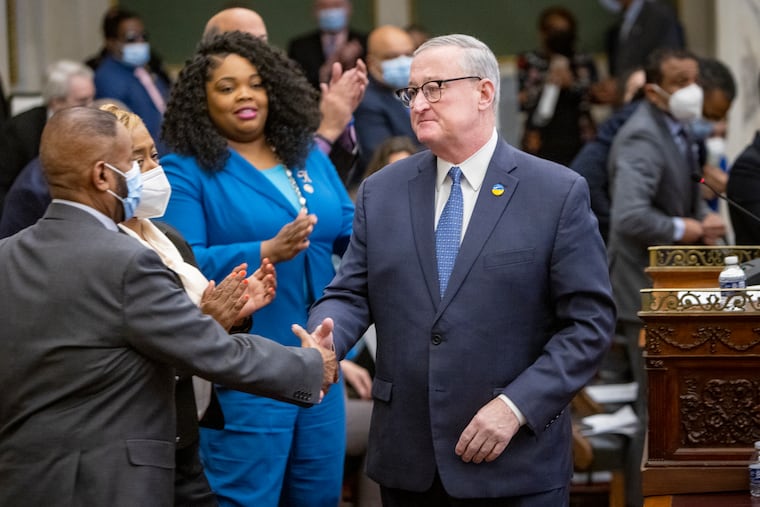Philly City Council has overturned Kenney’s veto of a bill creating a new city public safety director
Council’s vote clears the way for the proposal to appear on the May 16 primary ballot.

Philadelphia City Council on Thursday reversed Mayor Jim Kenney’s veto of legislation that would create a new cabinet-level position overseeing public safety, overriding the mayor despite objections from his administration.
The measure is now in the hands of voters. Changes to the Philadelphia Home Rule Charter, such as creating new offices, need to be approved by voters via a ballot question. With Council’s unanimous approval, the question is set to appear on the May 16 primary ballot.
The legislation, championed by outgoing Council President Darrell L. Clarke, creates a chief public safety director who would report directly to the mayor and would oversee the police, fire, prisons, recreation, and emergency management departments. In passing the bill, Council granted itself an unusual level of power over the next mayor: the ability to reject the mayor’s choice for the new position, and to dictate the job description and qualifications.
Veto overrides have been uncommon during Kenney’s tenure. In his seven years as mayor, Council overrode a veto one other time — in 2020, when he rejected a zoning bill that placed a height limit on new construction in the city’s Society Hill section.
In a letter to Council, Kenney wrote that the public-safety director bill was passed on an expedited timeline and that the legislative branch had not “done the necessary due diligence to fully assess whether this is an effective tool for this administration and future administrations to ensure the safety of all Philadelphians.”
» READ MORE: Philly City Council is proposing a new public safety director role. Is it a needed change, or a power grab?
The administration expressed reservations about the plan when it was being considered by a Council committee last month. Officials asked to delay it, saying they had not had enough time to assess its potential effect. The plan was introduced in mid-February and passed quickly, with Council shortcutting the typical legislative process by amending and adopting the measure on the same day.
Clarke said the reality of the city’s gun-violence crisis demands urgency. He said the creation of the position would allow for the city to streamline public-safety functions currently carried out by multiple departments and agencies.
“It’s time to do some things differently and have a direction that has been proven to be successful in other municipalities,” Clarke said. “People don’t want to hear about the charter that was written in [the 1950s]. People want to hear about, what are you going to do today to stop the violent crime in the city of Philadelphia?”
The measure requires the person filling the position to have “senior leadership experience in a law enforcement agency, legal entity, or other public safety position.” The chief public safety director is to be paid $265,000 annually, and they are responsible for providing department heads with policy guidance and securing all city-owned facilities, including schools and recreation centers.
But in his letter to Council, Kenney wrote that the managing director is currently responsible for overseeing public safety, and that adding a position with similar duties “could create the opposite of the intended effect and lead to a more complicated reporting structure, actually decreasing clear lines of authority and accountability.”
Administration officials said Clarke’s proposal could limit future mayors by dictating how they form their leadership system. Under current city law, mayors have wide latitude to shape the top rungs of their administrations.
Kenney, who is term-limited, will be replaced in January, so the charter change would likely only affect his successor. Eleven Democrats are running to replace him in a campaign that’s been in large part defined by crime and public safety.
The proposal can be seen as part of Clarke’s persistent efforts to transfer more power from the executive branch to Council over time. He has said that members of Council are ultimately held responsible by constituents for the city’s delivery of services and public-safety response.
The good-government group Committee of Seventy said in a statement Thursday that it’s become increasingly concerned with the proliferation of changes to the Home Rule Charter, saying the creation of the chief public safety officer is the most recent example of a “power struggle” between the executive and legislative branches.
The group said such a consequential amendment “should be vetted thoroughly not only by public safety experts and community stakeholders but also by those officials under the Mayor who would be affected by the change.”
Few other roles in a mayor’s administration require Council approval. The legislative body confirms appointees to a handful of boards, as well as the city solicitor, who serves as a legal adviser to Council. Council also has the power to approve or reject appointees to be the city’s victim advocate and its chief assessment officer.
Police commissioners and other agency heads are picked by mayors. Judges and the district attorney are independently elected.